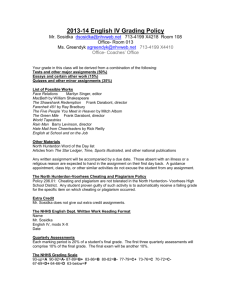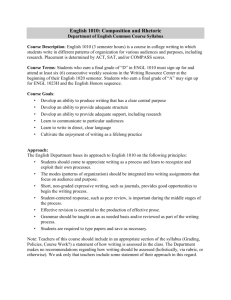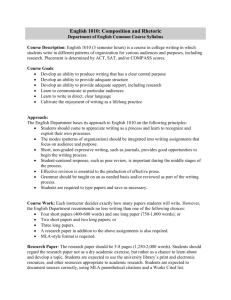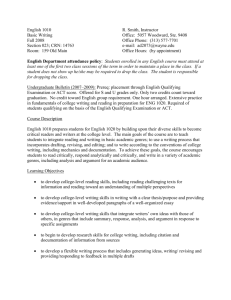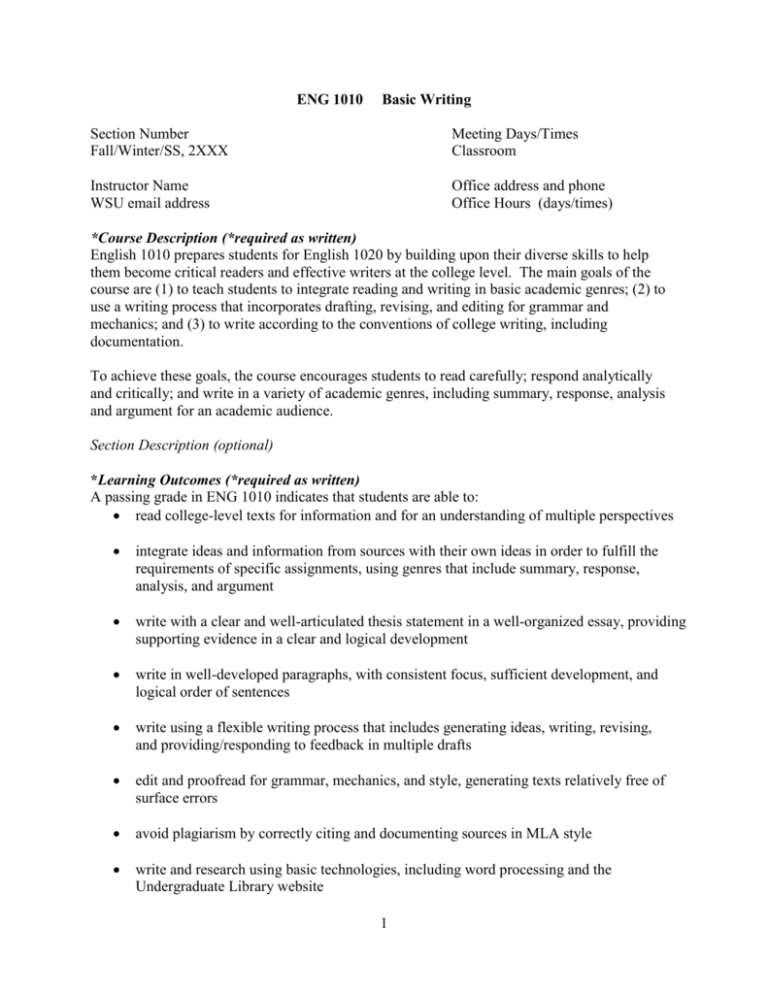
ENG 1010
Basic Writing
Section Number
Fall/Winter/SS, 2XXX
Meeting Days/Times
Classroom
Instructor Name
WSU email address
Office address and phone
Office Hours (days/times)
*Course Description (*required as written)
English 1010 prepares students for English 1020 by building upon their diverse skills to help
them become critical readers and effective writers at the college level. The main goals of the
course are (1) to teach students to integrate reading and writing in basic academic genres; (2) to
use a writing process that incorporates drafting, revising, and editing for grammar and
mechanics; and (3) to write according to the conventions of college writing, including
documentation.
To achieve these goals, the course encourages students to read carefully; respond analytically
and critically; and write in a variety of academic genres, including summary, response, analysis
and argument for an academic audience.
Section Description (optional)
*Learning Outcomes (*required as written)
A passing grade in ENG 1010 indicates that students are able to:
read college-level texts for information and for an understanding of multiple perspectives
integrate ideas and information from sources with their own ideas in order to fulfill the
requirements of specific assignments, using genres that include summary, response,
analysis, and argument
write with a clear and well-articulated thesis statement in a well-organized essay, providing
supporting evidence in a clear and logical development
write in well-developed paragraphs, with consistent focus, sufficient development, and
logical order of sentences
write using a flexible writing process that includes generating ideas, writing, revising,
and providing/responding to feedback in multiple drafts
edit and proofread for grammar, mechanics, and style, generating texts relatively free of
surface errors
avoid plagiarism by correctly citing and documenting sources in MLA style
write and research using basic technologies, including word processing and the
Undergraduate Library website
1
Methods of Instruction (optional)
*Required Textbook (*choose one or both)
Kennedy, Mary Lynch, and Hadley M. Smith. Reading and Writing in the Academic
Community. 4th ed. Upper Saddle River, NJ: Pearson Prentice Hall, 2010. Print.
and/or
Ruszkiewicz, John, Daniel E. Seward, Christy Friend, and Maxine Hairston. The Scott,
Foresman Writer. 5th ed. Boston: Longman, 2011. Print.
Additional Required Readings (as determined by instructor)
Books for this section are available at _________ (Barnes & Noble or Marwil’s).
Course Requirements (as determined by instructor)
Students are required to write 20-28 pages in ENG 1010.
Example
Course grades are awarded on a 100-point scale:
Attendance and Participation
Assignment #1 Summary draft
2 pages
Assignment #2 Summary final
2 pages
Assignment #2 Response
1-2 pages
Assignment #3 Response
1-2 pages
Assignment #4 Analysis draft
4 pages
Assignment #4 Analysis final
4-5 pages
Assignment #5 Argument draft
4 pages
Assignment #5 Argument final
4-5 pages
5 points maximum
5 points
10 points
10 points
10 points
10 points
20 points
10 points
20 points
Class attendance will affect the final grade as follows:
0 classes absent
0 points penalized
1 class absent
1 point penalized
2 classes absent
2 points penalized
3 classes absent
3 points penalized
4 classes absent
4 points penalized
each subsequent absence
5 points penalized
A grade of 75 points or higher is a S (Satisfactory) grade in ENG 1010; a grade of 74 points
or lower is a U (Unsatisfactory) grade in ENG 1010.
Grading Policies for Assignments (as set by individual instructors)
Examples
Expectations for assignments – all assignments will be distributed with an assignment
sheet and grading rubric.
Format for assignments – all assignments, including drafts, must be word-processed;
citation and documentation must follow MLA style.
2
Drafts and revisions – drafts are required for the summary, analysis, and argument
assignments. Assignments cannot be rewritten after the final grade has been
assigned.
Late papers – papers will be penalized one letter grade for each late day; papers will not
be accepted after 4 late days.
Making up work – in cases of emergency absences, and with the permission of the
instructor, students are responsible for turning in assigned work the next class period; late
penalties may apply.
*Plagiarism Policy (*required)
Example
Plagiarism is the act of copying work from books, articles, and websites without citing and
documenting the source. Plagiarism includes copying language, texts, and visuals without
citation (e.g., cutting and pasting from websites). Plagiarism also includes submitting papers that
were written by another student or purchased from the internet. Plagiarism is a serious academic
offense: the minimum penalty for plagiarism is an F for the assignment; the full penalty for
plagiarism may result in an F for the course. All cases of plagiarism in ENG 1010 will be
reported to the Department of English. Information about plagiarism procedures is available in
the Department of English.
Major assignments in ENG 1010 will be submitted to SafeAssign on Blackboard. SafeAssign
includes in its data base papers previously written by WSU students as well as papers plagiarized
from print or internet sources. All papers submitted to SafeAssign become part of the WSU data
base.
The Undergraduate Library’s reSearch program includes a module on avoiding plagiarism:
http://www.lib.wayne.edu/services/instruction/searchpath/mod6/04-plagiarism.html
Class Policies (as set by individual instructors)
Examples
English Department Attendance Policy – students who do not attend one of the first two class
sessions of an English course may be required to drop the course.
Class Attendance and Participation – class attendance is required, and attendance will be taken
at each class session. More than 20 minutes late will count as an absence. Attendance will be
graded as follows:
0 classes absent
5 points
1 class absent
4 points
2 classes absent
3 points
3 classes absent
2 points
4 classes absent
1 point
each subsequent absence
0 points
Adding and Dropping
students may add ENG 1010 during the first two class sessions if a spot is available.
3
students may drop ENG 1010 up until (date established by instructor); after this date, no
W grades will be given and students will be given a failing grade for the course.
Withdrawals [W]
Per WSU policy, the grade of WN is given to a student who did not attend any classes
and/or did not complete any assignments by the withdrawal date. If a student withdraws
after having received a grade for any component of a course, then W grades must be
either WP (withdrawal with a passing grade earned to date) or WF (withdrawal with a
failing grade earned to date).
Incompletes [I]
No I grades will be given in ENG 1010.
*Writing Center (*required as written)
The Writing Center (2nd floor, UGL) provides individual tutoring consultations free of charge
for students at Wayne State University. Undergraduate students in General Education
courses, including composition courses, receive priority for tutoring appointments. The
Writing Center serves as a resource for writers, providing tutoring sessions on the range of
activities in the writing process – considering the audience, analyzing the assignment or
genre, brainstorming, researching, writing drafts, revising, editing, and preparing
documentation. The Writing Center is not an editing or proofreading service; rather,
students are guided as they engage collaboratively in the process of academic writing, from
developing an idea to editing for grammar and mechanics. To make an appointment, consult
the Writing Center website:
http://www.clas.wayne.edu/writing/
To submit material for online tutoring, consult the Writing Center HOOT website (Hypertext
One-on-One Tutoring):
http://www.clas.wayne.edu/unit-inner.asp?WebPageID=1330
Student Disabilities Services (*recommended as written)
If you feel that you may need an accommodation based on the impact of a disability, please feel
free to contact me privately to discuss your specific needs. Additionally, the Student Disabilities
Services Office coordinates reasonable accommodations for students with documented
disabilities. The Office is located in 1600 David Adamany Undergraduate Library, phone: 313577-1851/577-3365 (TTY). http://studentdisability.wayne.edu
WSU Resources for Students (*recommended as written)
Adamany Undergraduate Library http://www.lib.wayne.edu/info/maps/ugl.php
Academic Success Center http://www.success.wayne.edu/
Counseling and Psychological Services (CAPS) http://www.caps.wayne.edu
Calendar of Class Sessions/Schedule of Assignments, including due dates (as established by
instructor)
Date and time of final exam, other exams, or quizzes, etc. (as established by instructor)
4
ENG 1010 Grading Rubric
The “S” Paper in English 1010:
1. The “S” paper meets or exceeds the specific requirements of the assignment. It is composed
according to the requirements of the assigned genre (summary, response, analysis, argument).
2. The “S” paper effectively integrates ideas and information from sources with the ideas of the
writer. It is composed to reflect multiple perspectives on the topic or issue of the paper.
3. The “S” paper forwards a clear and well-articulated thesis statement. The thesis is developed
by providing sufficient supporting evidence in a well-organized essay. The development is clear
and logical.
4. The “S” paper is carefully and coherently organized at the paragraph level. Each paragraph is
consistent in its focus, well organized in its presentation of evidence, and sufficiently developed.
The sentences follow a logical order within the paragraph.
5. The “S” paper correctly uses MLA style to cite and document information and ideas from
sources.
6. The “S” paper exhibits competent mechanics. It is grammatically sound, relatively free of
surface errors, and the style is well-suited to the assignment and genre.
The “U” Paper in English 1010:
1. The “U” paper does not meet the specific requirements of the assignment. It demonstrates an
incomplete or incorrect sense of assigned genre (summary, response, analysis, argument).
2. The “U” paper does not effectively integrate ideas and information from sources with the ideas
of the writer. It does not demonstrate an understanding of multiple perspectives on the topic or
issue of the paper.
3. The “U” paper lacks a clear thesis statement, or the thesis statement is simplistic or unclear.
The thesis is not developed with sufficient supporting evidence in a clear and logical
organization.
4. The “U” paper has poor paragraph development. Paragraphs are inconsistent in focus,
unorganized in their presentation of evidence, or insufficiently developed. The sentences do not
follow a logical order within the paragraph.
5. The “U” paper shows signs of deliberate or inadvertent plagiarism. The paper does not
correctly use MLA style to cite and document information and ideas from sources.
6. The “U” paper exhibits poor mechanics. It contains numerous grammatical and mechanical
errors. The style is not appropriate to the assignment and genre.
5

